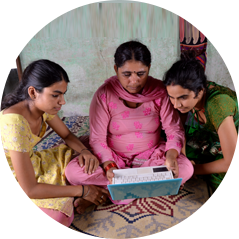Tata Power Delhi Distribution Limited [Tata Power-DDL] is a joint venture between Tata Power and the Government of NCT of Delhi with the majority stake being held by Tata Power Company (51%).
- Distributes electricity in North & North-West Delhi
- Serving a populace of around 9 Million
- A customer base of over2 Million
- Peak load of 2481 MW* *As of FY 2024-25
- Distribution area of 510 sq. km.
Front runner in Power Distribution Reforms
Tata Power-DDL is acknowledged for its consumer-friendly practices. Since privatization, the Aggregate Technical & Commercial (AT&C) losses in Tata Power-DDL areas have shown a record decline.
Today, AT&C losses stand at 5.54 (as of FY 2024-25) which is an unprecedented reduction from an opening loss level of 53% in July 2002.
To ensure reliable power supply and to provide best in class service to its consumers, Tata Power–DDL has implemented several world-class technologies such as Advance Distribution Management system or ADMS which is designed to replace the conventional SCADA-DMS-OMS system with features like real-time integration of Smart Meter Data / Distributed Generation integration and single data model from GIS , Integrated Geographical Information System (GIS) for instant services, Advanced Metering Infrastructure (AMI), Automated Demand Response (ADR), Smart Street Light Management system, Field Force Automation, Upgraded Network, Integrated Toll Free Helpline No. 19124, etc.
WORLD CLASS TECHNOLOGIES
@ TATA POWER-DDL:
 Advanced Distribution Management System or ADMS
Close
Advanced Distribution Management System or ADMS
CloseAdvance Distribution Management System (ADMS) is a single integrated system which will facilitate advanced monitoring, analysis, as well as control and planning, thereby enabling Tata Power-DDL to enhance the reliability, safety and efficiency of the power for the consumers. This system has advanced features of reporting outages and intimating to customers upfront. This system facilitates system controller as well as maintenance team for faster restoration of supply.
-
 Geographical Information System
Close
Geographical Information System
CloseGeographical Information System (GIS) is a foundational technology and single source to have repository of network, asset and consumer indexing for Tata Power-DDL. The data of this system gets integrated with ADMS, FFA, ERP, AMI, etc. for successful functioning of respective systems. This system enables delivering of results in terms of reliable & quality power along with advanced services and timely information to the consumers.
-
 Smart Meter
Close
Smart Meter
CloseSmart Meters are basic building blocks of Smart Grid. This technology encompasses Communication System (RF in Tata Power-DDL’s case) and Data Handling Technologies (Meter Data Management System). Tata Power-DDL is implementing Smart Metering Technology (Advanced Metering Infrastructure-AMI) to bring operation efficiency in different IT and OT domains. This technology will bring transparency to consumers in terms of their consumption per month and monitoring of other critical parameters like MDI and PF on an instant basis. For Tata Power-DDL, it enables easy detection of pilferage and loss reduction. This last mile link will complete Smart Grid implementation by Tata Power-DDL.
-
 Smart Street Light Management System
Close
Smart Street Light Management System
CloseTata Power-DDL jointly is working on a project for achieving a reduction in the demand of street lighting which coincides with peak load, thereby reducing the overall peak demand, improving the lux levels, improving the power factor and checking the carbon foot print as a responsibility to the society. This will translate into considerable saving to the exchequers. This system is entirely managed through a Smart Centralized Control & Monitoring System which can identify partially or completely affected streetlight circuits on a real-time basis and the type/nature of fault, thereby alerting the maintenance team without any requirement of consumer complaints for such purpose. This will enhance safety & security of general public. It can also detect pilferage from street light circuits and generate alerts.
-
 Field Force Automation
Close
Field Force Automation
CloseCustomer service through mobile workforce is the key to exceed the expectations of the consumer. Field Force Automation (FFA) is a system which optimizes the various tasks in hand and schedules & dispatches the nearest Crew to provide faster service to the consumers. This system not only enhances the service level but also completely tracks the allocation of workforce.
Tata Power-DDL is the first Indian utility to be a member of Global Intelligent Utility Network Coalition (GIUNC) which is a coalition of 14 power utilities worldwide and is working towards accelerating the development of common standards, technology solutions and processes for intelligent networks.
Tata Power-DDL provides various facilities and services to its consumers for their ease and convenience such as 24X7 Integrated Helpline, Mobile Application for both iOS and Android users, bilingual website, Multiple Payment Avenue, End to End online services for New Connection, etc.
Tata Power-DDL Wins the Prestigious Deming Prize 2024 – A Global First for Power Distribution
Tata Power-DDL has been awarded the Deming Prize 2024 for excellence in Total Quality Management (TQM). This recognition makes Tata Power-DDL the first power distribution company in the world to receive this prestigious global honor. Awarded by the Union of Japanese Scientists and Engineers (JUSE), the Deming Prize is one of the highest international accolades in the field of quality management.
This milestone reflects Tata Power-DDL’s unwavering commitment to customer service excellence, continuous performance improvement, and total employee involvement. With over six years of dedicated TQM implementation, the company has transformed its operational processes and elevated its business performance to global benchmark levels.
Tata Power-DDL's achievement sets a new standard for Indian power utilities, inspiring the industry to embrace quality management as a path to sustainable growth and customer satisfaction.

Committed to Being Sustainable
TATA Power-DDL has also added solar generation as a part of its sustainable initiatives since 2008, and has installed eighteen (18) Solar Plants in its Licensed Area with a total generation capacity of 1.9 MWp. It has a total of 2639 Rooftop solar plants under net metering with a cumulative capacity of 65 MWp. The company has set up a state-of-the-art Smart Grid Lab showcasing advance technology being adopted with integration of Roof Top Solar, Energy Storage, E-Charging of Electric Vehicles, Home Automation etc. in its network.

Expanding Beyond Boundaries
Tata Power-DDL's change management experience, distributed leadership system, adoption of latest technology; robust competence development process and innovative & open work culture are the key strategic boosters which helped in building and sustaining competitive advantage in the changing business scenario. A journey which began a decade ago for empowering the consumers in Delhi now holds the potential to transform the distribution sector in India and similarly help utilities across the globe. Tata Power-DDL has a presence in India in nearly 20+ States and working with 30+ Discoms including Goa, Haryana, Uttar Pradesh, Chhattisgarh etc. as well as in International cities such as Benin, Eko, Kaduna, Kano etc.

Partnering with the Experts
Tata Power-DDL is focused and committed to the road ahead and is exploring new opportunities to replicate its experience of distribution reforms both in India and abroad. It is leveraging its unique learning and skillsets solely and in collaboration with leading utilities and technology providers like GE, IBM, Enel, Omron, 3M, Panasonic, AES, Mitsubishi etc. in the areas of communications & smart grid technology, change management, consumer service delivery and business process re-engineering. Tata Power-DDL has also collaborated with leading international and national Institutions like Harvard, MIT, Ryerson University, IIT Delhi, Punjab Engineering College, Delhi University,Netaji Subhas Institute of Technology etc. to carry out research activities in energy space.

Giving Back to the Community
Tata Power-DDL has also been reaching out to the communities it serves and has been consistently strengthening and empowering the underprivileged, primarily over 1.5 million people residing in over 223 JJ clusters in its area of operation who are also company’s consumers through its focused Social Innovation Initiative SAATHI. Under the umbrella of SAATHI several initiatives, like Women Literacy Centres, Vocational Training Centres, Tutorials, Medical Camps, Drug de-addiction camps, Energy Conservation, safety etc. Tata Power-DDL is sensitive to the aspect of Climate Change and is committed to introducing energy efficient and greener technologies. It is working very closely with EESL to promote Energy Efficient schemes.




 Login
Login




